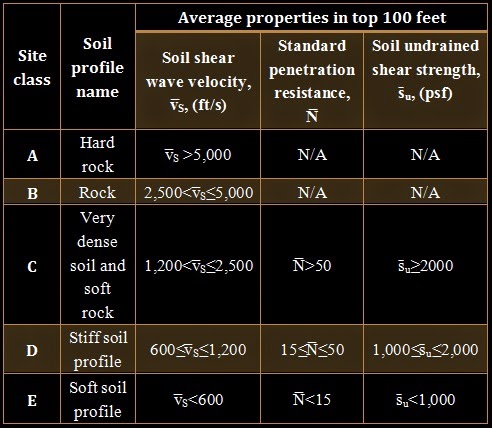The site classification is usually related to earthquake design. In our few upcoming posts, we will try to introduce IBC requirements in designing foundation in relation to earthquake perspective. Depending on soil properties of construction site, sites are classified as
• Class A
• Class B
• Class C
• Class D
• Class E
• Class F
definition of site classification according to IBC are presented below:
Site class F:
If any profile of soils have any of following or combination of following characteristics:
1. Soils susceptible to potential collapse or failure under earthquake loading like liquefiable soils, clay having high sensitive and quick clay, collapsible loosely cemented soils.
2. Clays having high organic content and or peats having thickness of layer more than10 feet
3. Clays having very high (PI>75) plasticity; layer thickness more than 25 feet.
4. Stiff clays (soft to medium) of very thick (greater than 120 feet).
Though site class E is defined based on shear wave velocity, standard penetration resistance and undrained shear strength, if any profile with more than 10 feet of soil having the following characteristics should also be treated as site class E:
So shear strength, resistance against standard penetration and shear wave velocity are required to classify site according to IBC. In some class like E and F plasticity index, moisture content, organic content are important though these properties are relatively simple to determine.
In
defining site classification we depend on v̅S, N̅, and s̄u where
v̅S= Shear wave velocity of soil at site (ft/s)
N̅= Resistance against standard penetration
s̄u= Undrained shear strength of corresponding soil (psf)
Though site class E is defined based on shear wave velocity, standard penetration resistance and undrained shear strength, if any profile with more than 10 feet of soil having the following characteristics should also be treated as site class E:
So shear strength, resistance against standard penetration and shear wave velocity are required to classify site according to IBC. In some class like E and F plasticity index, moisture content, organic content are important though these properties are relatively simple to determine.
In some cases, when we have no sufficient details about site soil, it is recommended to define site as site class D. But we can assume this only when geotechnical data or building officials ensure that site do not fall in the class of E/F.
When a site cannot be classified as Class F, this site can be taken as site class E under following conditions:

.jpg)

No comments:
Post a Comment